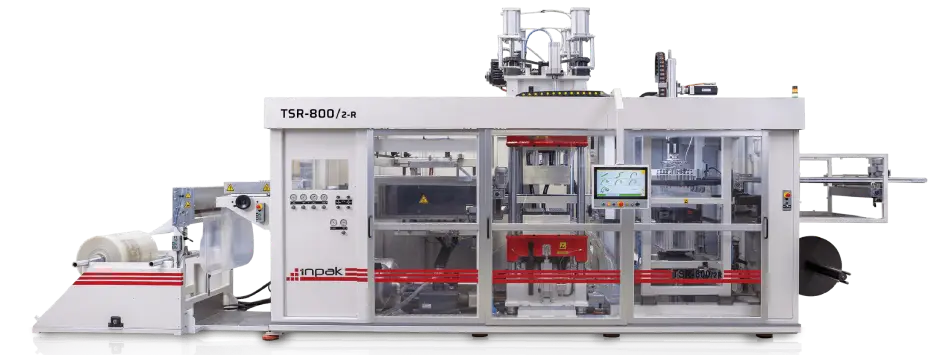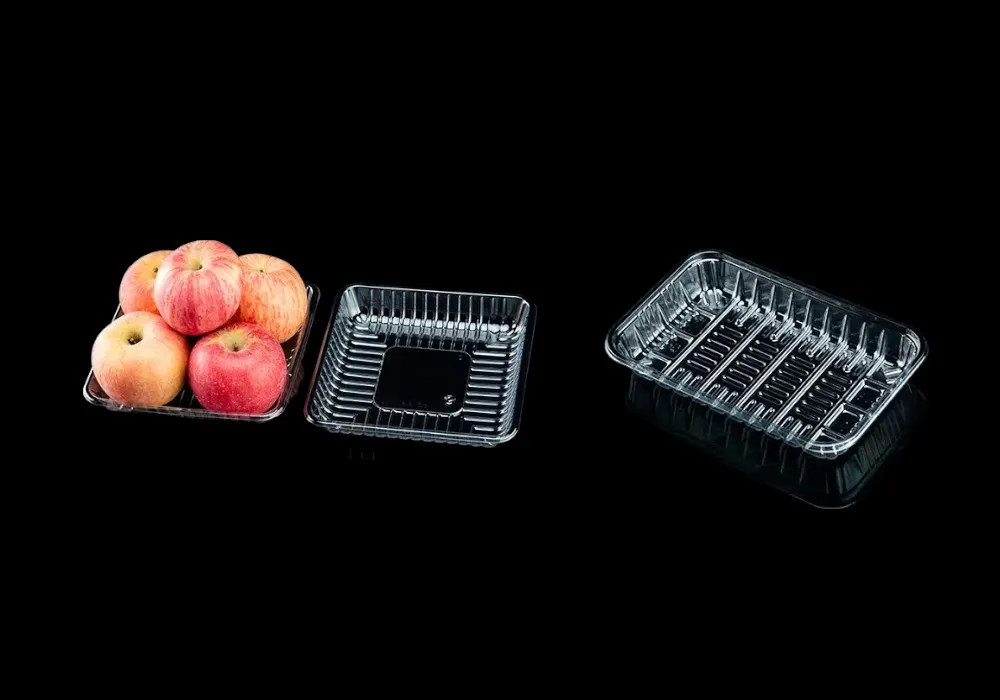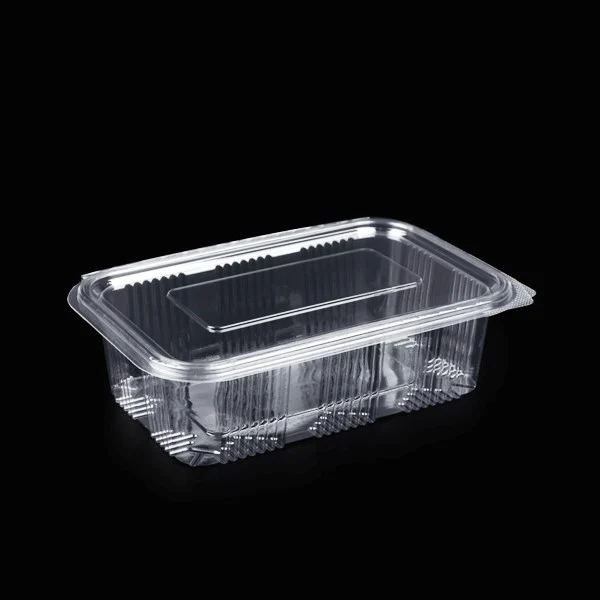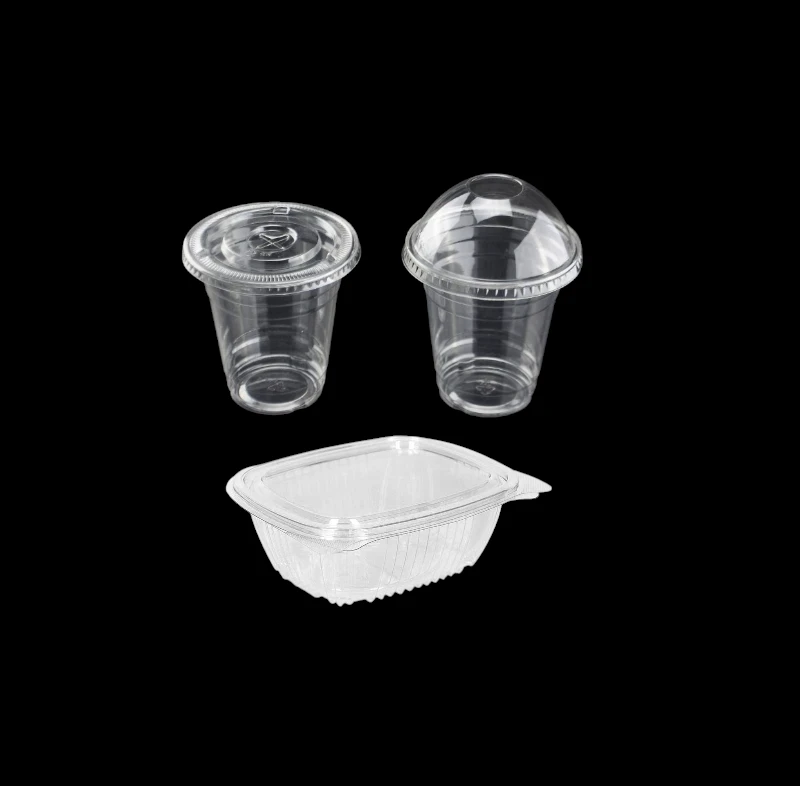Hygienic Thermoformed Trays for Food Packaging by INPAK
In today’s competitive market, the importance of thermoformed trays for food packaging cannot be overstated. INPAK’s dedication to producing hygienic and compliant packaging solutions positions them at the forefront of the industry. Their trays are meticulously engineered to meet stringent food safety regulations, ensuring both product integrity and consumer trust.
Table of Contents
As a leader among thermoforming machine manufacturers, INPAK understands that producing consistent and sterile packaging is essential. Their expertise in thermoforming machines enables them to provide a seamless integration of tray design and production. By leveraging their knowledge in food packaging machines, INPAK ensures that every tray meets exacting standards for hygiene and functionality.
INPAK’s portfolio demonstrates their commitment to advanced technology and quality. Their solution-centric approach caters specifically to the food packaging trays segment, focusing on preventative hygiene features, simplified maintenance, and enhanced traceability. These attributes make INPAK’s trays a premium choice for forward-thinking businesses aiming to differentiate themselves in the market.
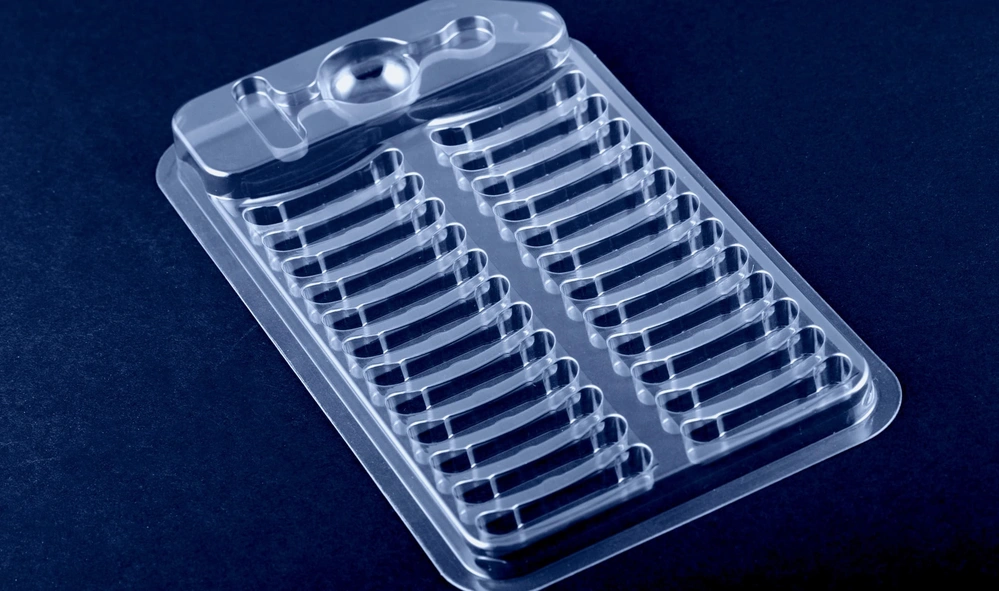
Hygienic Thermoformed Trays for Food Packaging by INPAK
What Are Thermoformed Trays and Why Are They Used in Food Packaging?
Thermoformed trays are plastic containers created through a process where plastic sheets are heated and shaped using a mold to produce rigid, custom-formed packaging solutions. These trays are a fundamental part of modern food packaging machines due to their adaptability, structural integrity, and cost-efficiency. The main function of thermoformed trays for food packaging is to protect food products, extend shelf life, and offer convenient handling, storage, and display for retailers and consumers.
The use of thermoformed plastic trays is essential in maintaining hygiene and food safety standards. These trays are designed to be single-use or reusable, depending on the application, and are typically made from materials like PET, PP, or CPET that are food-safe and recyclable. With precise molding, plastic food trays can be tailored to fit specific food products, reducing the risk of contamination and ensuring a tight, hygienic seal during packaging.
Another reason why thermoformed packaging is widely used in the food industry is its flexibility in design. Whether it’s portion control, product visibility, or stackability, food packaging trays meet diverse needs while optimizing packaging lines. The compatibility of these trays with thermoforming machines makes them an efficient choice for high-speed production and consistent quality across batches.
Key Benefits of Hygienic Thermoformed Food Trays
One of the primary advantages of thermoformed trays for food packaging is hygiene. These trays are produced in controlled environments, minimizing contamination and supporting strict food safety regulations. Their sealed edges and uniform structure ensure that food stays fresh, safe, and visually appealing throughout the supply chain. The use of thermoformed plastic trays helps prevent bacterial growth and preserves the quality of perishable products like meat, dairy, fruits, and ready meals.
In terms of efficiency, plastic trays offer streamlined operations in food packaging machines. Their uniform shape and size allow for easy automation, reducing the need for manual handling. This results in faster packaging speeds, lower labor costs, and reduced material waste. Since the trays can be custom-molded, manufacturers also benefit from optimized space utilization during transport and storage.
Sustainability is another important benefit of thermoformed packaging. Many trays are now made from recyclable or biodegradable materials like rPET or PLA, aligning with eco-conscious business practices. The lightweight nature of thermoformed trays also contributes to lower carbon emissions during shipping. Combined with the adaptability of thermoforming machines, these packaging solutions offer a balanced approach to performance, safety, and environmental responsibility.

Hygienic Thermoformed Trays for Food Packaging by INPAK
How Are Thermoformed Trays Manufactured?
The production of thermoformed trays begins with selecting the appropriate plastic material, usually in sheet form. This sheet is then heated in a thermoforming machine until it becomes pliable. Once the material reaches the desired temperature, it is formed over a mold using vacuum, pressure, or a combination of both, to create the shape of the tray. The formed tray is then cooled and trimmed to final specifications, ensuring consistency and precision.
Thermoforming machines play a crucial role in maintaining high standards of hygiene and efficiency during this process. Advanced equipment includes features like automated feeding systems, servo-driven movements, and precise temperature controls. These enhancements allow for better material distribution, reduced defects, and quicker cycle times, essential for high-volume production in food packaging machines.
Once the trays are formed and trimmed, they undergo inspection to ensure they meet quality standards. The trays can then be used directly in food packaging applications or transported to different locations. This manufacturing process is highly scalable, making thermoforming machine production suitable for both small-batch runs and large-scale operations. It offers a reliable solution for producing durable, attractive, and hygienic plastic food trays.
Industries and Applications of Thermoformed Food Packaging
Thermoformed packaging has broad applications across various segments of the food industry. In ready meals and convenience food sectors, thermoformed trays offer reliable sealing, easy heating in microwaves or ovens, and excellent shelf presentation. These trays are designed to withstand temperature variations, making them ideal for frozen meals, deli products, and takeout items.
The meat and poultry industry also heavily relies on thermoformed plastic trays for preserving freshness and preventing cross-contamination. These trays are designed to accommodate specific cuts, portions, or whole products. Combined with vacuum sealing, plastic food trays provide a robust barrier against external elements, significantly extending shelf life and enhancing safety.
In the dairy, bakery, and produce sectors, food packaging trays are used to display products attractively while keeping them safe from moisture, light, and bacteria. These industries demand flexible, cost-effective packaging that can be customized for various product types. The role of thermoforming machines in ensuring consistent tray quality across all these applications is crucial, supporting efficient and hygienic production lines.
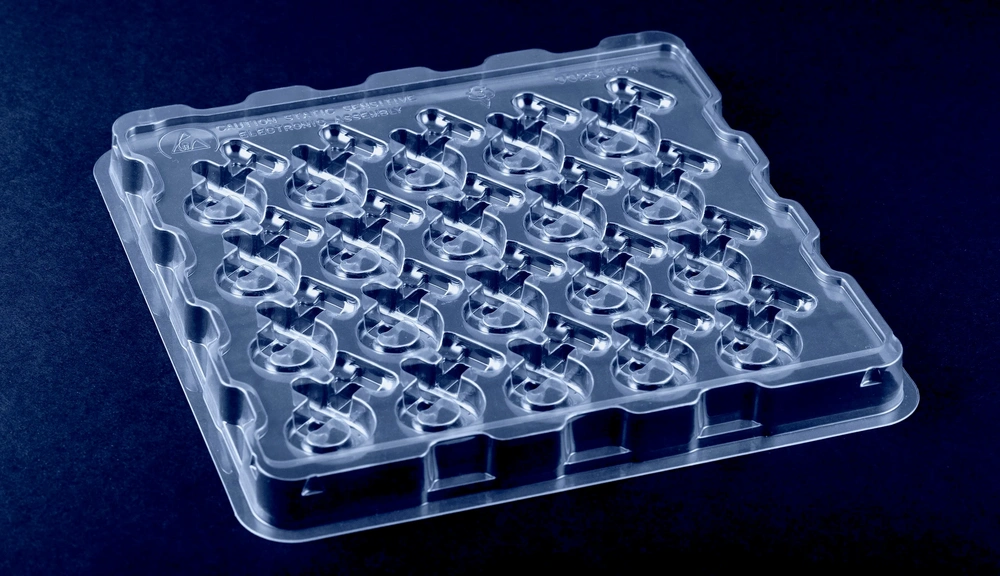
Hygienic Thermoformed Trays for Food Packaging by INPAK
Types of Thermoforming Machines Used in Tray Production
There are several types of thermoforming machines used in tray manufacturing, each suited to different production requirements. Vacuum forming machines are one of the most common, using suction to mold heated plastic into tray shapes. These machines are known for their simplicity and cost-effectiveness, especially for shallow or single-use trays in thermoformed packaging.
Pressure forming machines apply both vacuum and positive pressure to form trays with higher definition and sharper details. These machines are preferred when aesthetics and precision are critical, such as in retail food displays. Their compatibility with a variety of materials allows for the production of advanced plastic trays with intricate designs.
Roll-fed thermoforming machines are widely used for high-speed, automated production lines. They continuously feed plastic rolls into the machine, heat, form, trim, and stack the trays in one seamless operation. These machines offer excellent consistency and are ideal for mass-producing food packaging trays. Their high throughput capabilities make them a preferred choice for large-scale thermoforming machine manufacturers.
Thermoforming Machines for Thermoformed Tray Manufacturers
For businesses engaged in thermoformed tray production, choosing the right thermoforming machines is critical to achieving quality, efficiency, and flexibility. These machines must align with the type of trays being produced, the material being used, and the desired production volume. Features like servo motors, remote diagnostics, and customizable heating zones are now standard in advanced thermoforming machine manufacturing.
Food packaging machine manufacturers prioritize machine reliability, ease of maintenance, and energy efficiency. This ensures uninterrupted operations and minimal downtime, which is especially important in food production where speed and hygiene are paramount. Choosing the right thermoforming machine supplier helps in obtaining machinery that meets both current production needs and future scalability.
Modern thermoforming machine production also considers sustainability. Manufacturers are increasingly integrating features like material recycling systems, smart energy usage, and reduced scrap generation. These innovations enable thermoformed tray manufacturers to meet environmental goals without sacrificing performance. Selecting machines from a trusted thermoforming machine supplier ensures long-term success and competitive advantage.

Hygienic Thermoformed Trays for Food Packaging by INPAK
INPAK’s Role in Supplying Advanced Thermoforming Equipment
As a leading thermoforming machine manufacturer, INPAK provides comprehensive solutions for businesses involved in food packaging. Their machines are engineered for precision, speed, and reliability, catering to a wide array of packaging needs. With a focus on hygienic design and user-friendly interfaces, INPAK supports both small-scale operations and industrial-level thermoforming machine production.
INPAK’s machines are designed to work with various materials used in thermoformed trays, such as PET, PP, and PLA. The equipment includes automated systems for forming, trimming, stacking, and quality control, all of which help streamline production and ensure consistency. Their ability to customize machines for specific plastic tray designs makes them a preferred thermoforming machine supplier across multiple industries.
With global reach and a commitment to innovation, INPAK continues to support the evolution of thermoformed packaging through cutting-edge technology. Whether for food packaging trays, industrial applications, or specialty solutions, INPAK delivers performance-driven equipment that sets industry benchmarks. Their role in thermoforming machine manufacturing is central to enabling hygienic, efficient, and sustainable packaging systems.
